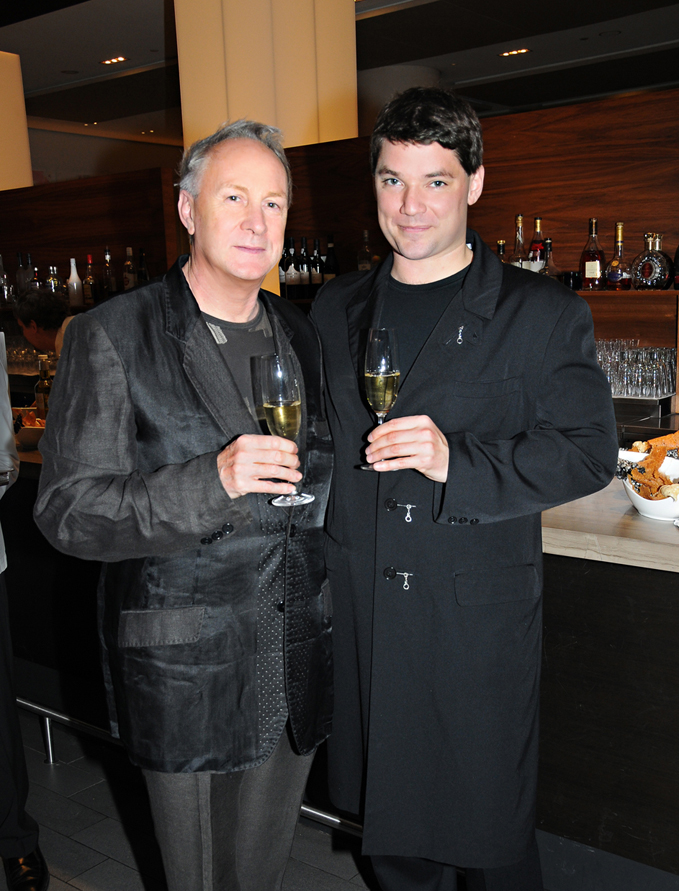
Restaurateur James Morris today, pictured here with Richard Maloney at Toronto’s Nota Bene where they were attending the annual Stratford Chefs School Gala Dinner.
In the fourth of a still-nascent series we probe the memories and minds of some of the founding fathers and original influencers of Toronto’s restaurant scene.
This week we speak with a gentleman who certainly knows his way around a dining room, Mr. James (Jim) Morris, Patron of Stratford’s acclaimed Rundles restaurant.
Good Food Revolution: Hello, Jim. Now — how long have you been involved in the hospitality industry and where did you get your start?
James Michael (Jim) Morris: 50 years: My involvement began with a summer job in the south-west of Ireland. I then trained in hotel management, in Dublin. After that, I spent a number of years living and working in the UK, before coming to Toronto (and working at the legendary Winston’s – JD), and then to Stratford.
GFR: And, although this is a huge question: What are the most significant changes that you have seen in the dining scene over the decades?
JMM: Apart from the upheaval brought on by the molecular/techno-emotional movement, which, it seems, will have little lasting effect, and the extremes of the ultra-local chefs, much of what has happened at Rundles has been more of an evolution than a change.
GFR: How do you feel about Toronto as a restaurant city? Do you feel as if we are world-class in this department, or do we still have some way to go?
JMM: I do not think that Toronto will ever have the market (let alone the kind of support systems that sustain[ed] the Adrias of this world) to sustain grand restaurants of the kind that Canadian foodies patronize when they travel. Clearly, the prevailing mind-set is, if you are going to devote that much time, energy, and money, to gastronomy, do it in France, or Japan, or, more recently, in some places in Spain and the USA.
GFR: What, with a number of New York Chefs opening outposts in Toronto, do you think that this says about the evolution of our dining scene, and, perhaps more poignantly, global dining as a whole?
JMM: If having well-known chefs here from NYC or anywhere else helps to ramp-up the Toronto dining scene, why not have them? As to how much more successful they’ll be (than the local restaurateurs) in inspiring the Toronto market to commit more to gastronomy, or whether or not they will be able to add anything of lasting value, it’s much too early to say.

James Morris’ Canadian Citizenship card picture from 1975 when he was working at Winston’s, Toronto.
GFR: Message boards such as Chowhound often bemoan the lack of polished service in Canada. Do you see any truth in this?
JMM: Few of those who serve here, in Canada, see service as a profession, which is a mixed blessing. Often, what these people lack in the polish that sometimes comes with dedication, they make up for in youthful energy and enthusiasm. When one compares the attitudes of servers here, in general, to those that one often encounters in the “old world,” energy and enthusiasm would seem preferable to jaded bitterness any day.
GFR: What in your mind makes for good service?
JMM: Gastronomical literacy … being approachable … ability to think on one’s feet, juggle conflicting demands, make people feel special, provide direction, keep order, and be even-tempered and consistent.
GFR: Over the years, where have you experienced the best service in Toronto?
JMM: When you worked at JKWB, you yourself were extraordinary. Some of the people we helped to bring up, at Rundles, and who’ve ended up at Scaramouche – Ian Clark, in particular – too, are excellent; as are Mark Hashimoto and his mother.

James Morris playing Algernon in an amateur production of Oscar Wilde’s The Importance Of Being Earnest, 1975.
GFR: Does the future of the independent restaurant in Ontario look bleak or blissful from your point of view?
JMM: As always, if you’ve got the right thing, in the right place, at the right time, you can do well as an independent. But, as you are no doubt aware, even if one is successful, it does not take much to change that.
GFR: “No-shows” can be the death of a small establishment. What do you feel can be done (legally) to combat such situations?
JMM: Anything “legal” is usually too complicated, expensive, and time-consuming. Were Rundles to have this problem, we would take deposits, which would be refunded only if the prescribed notice of a cancellation were given.
GFR: So do you feel that a “no reservations” policy is a sensible solution for a smaller restaurant?
JMM: Perhaps for some. But it would make our lives at Rundles much too unpredictable. Therefore, it would make it difficult for us to maintain the consistent level of quality for which we strive.

A portrait of James Morris by Canadian Artist/Theatre Designer Christina Poddubiuk portrait, circa 1992. Commissioned for use on the Rundles menu.
GFR: How do you feel the recent increase in minimum wage in Ontario impacts the restaurateur?
JMM: The steady increase in the minimum wage over the past few years has made it all but impossible for us to keep labour costs within budget, which has made it necessary for us to employ fewer people. This does not help either the quality of service that we are able to provide, or the employment situation.
GFR: Getting into the area of tips: Do you feel that serving staff should pay something to the house for breakages and the like? What do you feel is fair or are such expenses just a cost of doing business?
JMM: Breakages are inevitable. Staff should only be required to pay for them if they were caused by careless behaviour.
GFR: And what are your thoughts on the recent case regarding Mario Batali settling a lawsuit regarding skimming of tips to the tune of $5.25 million?
JMM: I did not know about this, however, the fact that he did this (or had to do it) seems a sad reflection on him.

James Morris has always had quite the appreciation for wine and this is captured perfectly in an scratchboard engraving by artist Scott McKowen for the book A Winelover’s Diary (Firefly 1999)
GFR: On the subject of restaurant critics, do you feel that any are worth their salt?
JMM: If, like the Michelin people, they are slow to give recognition, and slow to take it away, and, in so doing, they have earned their readers’/followers’ trust, then they make an important contribution to gastronomy. Should this not be the case, they’re irrelevant.
GFR: And how do you feel about the legitimacy of guides like Zagat and its ilk?
JMM: If they help to inform people, and, (so long as it’s deserved) bolster a good reputation, then they do help. But, as with many such publications, if their ratings can easily be manipulated, why would anyone waste his/her money and time by following their recommendations? In short: Caveat emptor!
GFR: And then of course we have the democratization of food writing… food bloggers… where do you stand on this particular issue?
JMM: Please see the cartoon, below:
GFR: It appears to me that Toronto goes through very obvious trends in its restaurants (tacos, bacon on and in everything). I’d love to hear your thoughts on this topic.
JMM: Tacos and bacon have their place, and, so long as the restaurateurs who choose to use them appreciate this, why shouldn’t they use them? Most probably, problems arise when people are blindly following trends without fully understanding what they are doing.
GFR: And what, in your sage wisdom, do you predict for the future?
JMM: Lots more of the “blind leading the blind,” and, as always, the odd chef/restaurateur who is a trailblazer – an artist.
GFR: Food Television has exploded over the past 10 years… how accurate a portrayal do you feel it paints of our industry?
JMM: I’m afraid that I never watch it. So, I have no opinion on this. Sorry.
GFR: Canadian wines have come a long way since I arrived in Canada 17 years ago. Do you still feel that there is a resistance to them in some quarters? And why do you think that could be?
JMM: There is much less resistance than there was in the early days of our going form the foxy local grapes to vinifera, and from plastic bungs to corks. Have you been here long enough to have heard the following joke?
Q. Did you know that, in Niagara, they are now making wine with corks?
A. Well, here’s hoping that it’s better than the wine they’ve been making with their grapes.
GFR: Actually, I had never heard that before. Thank you so much for your time Jim.
…
 Edinburgh-born/Toronto-based Sommelier, consultant, writer, judge, and educator Jamie Drummond is the Director of Programs/Editor of Good Food Revolution… And he actually blushed a little there.
Edinburgh-born/Toronto-based Sommelier, consultant, writer, judge, and educator Jamie Drummond is the Director of Programs/Editor of Good Food Revolution… And he actually blushed a little there.








